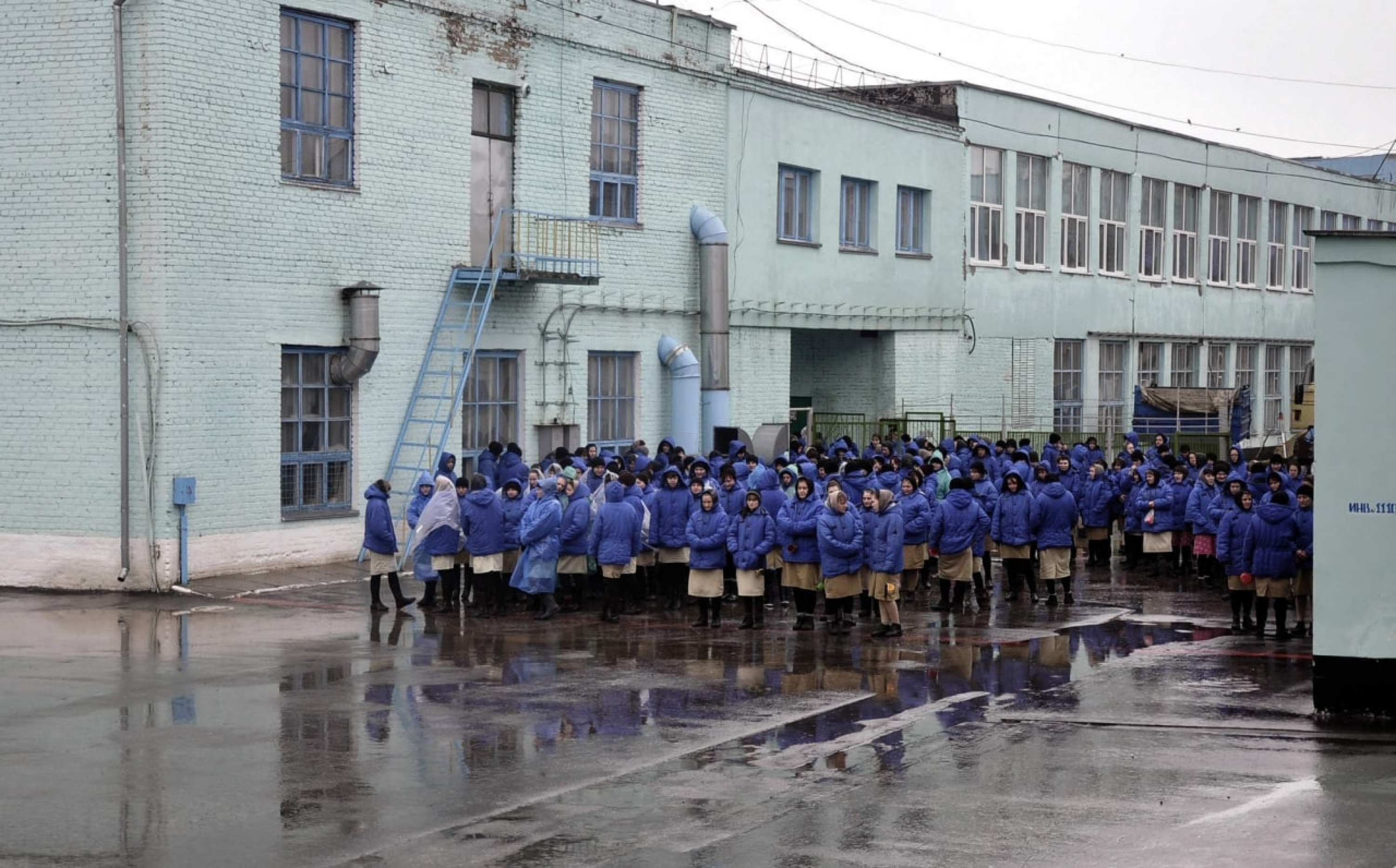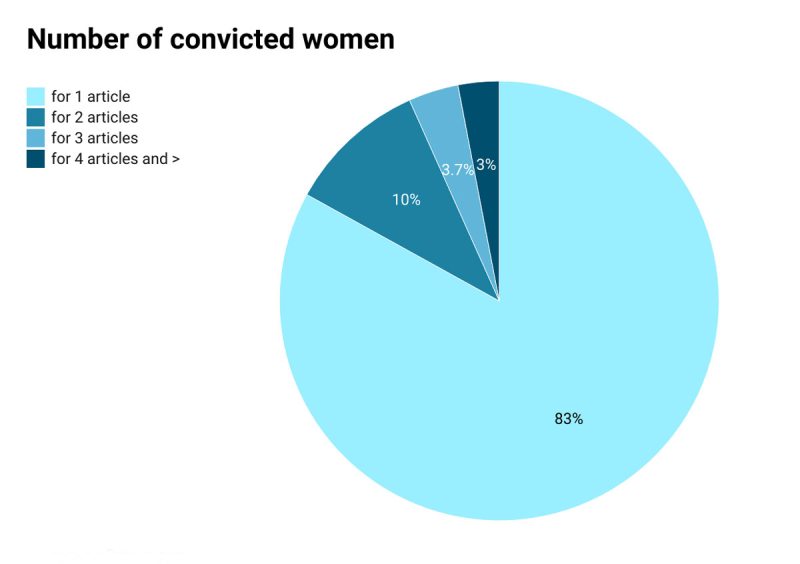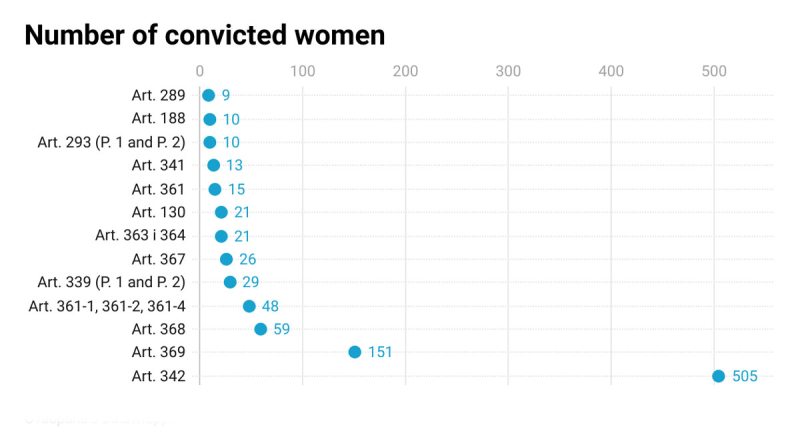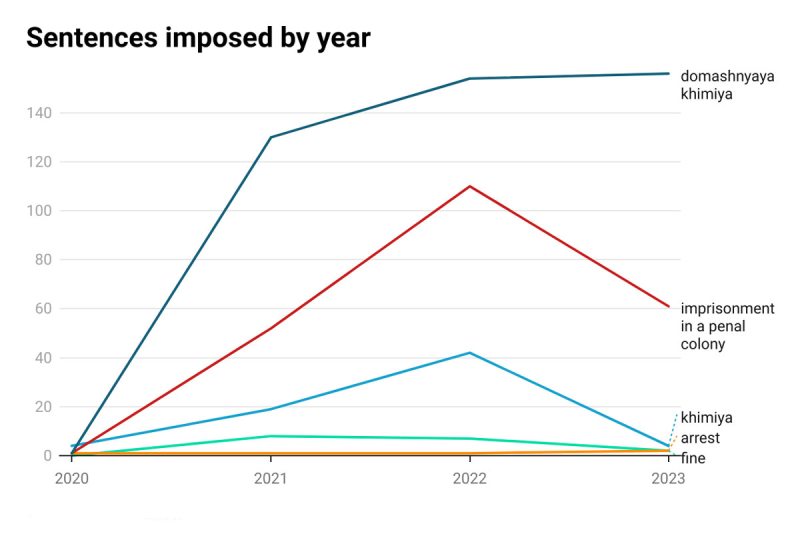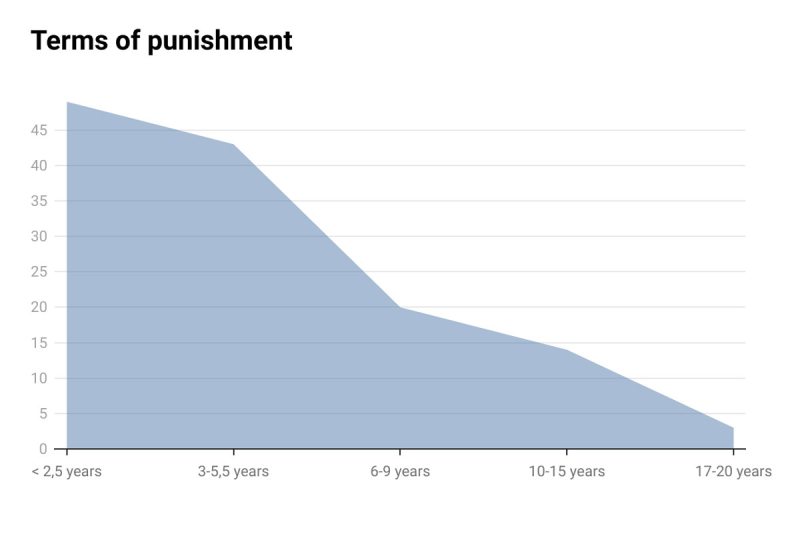Female political prisoners: unveiling portraits and imprisonment motivations
Viasna human rights defenders collected and analyzed data on politically motivated criminal prosecution of women in Belarus.
Who is behind bars?
According to human rights activists, as of December 25, 2023, there were 1,496 political prisoners in Belarus, 174 of them were women.
Since 2020, at least 895 women have been prosecuted for political reasons, including seven who were convicted in special proceedings ("in absentia") for terms ranging from 12 to 15 years of imprisonment. These are Aliaksandra Herasimenia, Yanina Sazanovich, Valeryia Zaniamonskaya, Volha Vysotskaya, Volha Kavalkova, Maryia Maroz, and Sviatlana Tsikhanouskaya.
At the same time, 750 women were convicted under one article, 92 women under two, 33 women under three, and 27 women under four or more articles.
Marfa Rabkova, coordinator of the Viasna volunteer service, was sentenced to 15 years in prison under 12 articles of the Criminal Code. According to the results of the appeal, the term of imprisonment was reduced by only three months: 14 years and 9 months of imprisonment.
Tatsiana Kurylina was also convicted under 12 articles, but she was charged with less serious crimes, and her sentence was four and a half years of imprisonment.
Aliaksandra Kasko, who returned to Belarus from Poland, was sentenced to ten years of imprisonment under eight articles of the Criminal Code.
People who suffered for helping others are kept behind bars:
- nine journalists and media representatives: Katsiaryna Andreyeva, Kseniya Lutskina, Maryna Zolatava, Liudmila Chekina, Valeryia Kastsiuhova, Iryna Leushyna, Iryna Slaunikava, Ina Mozhchanka, Larysa Shchyrakova;
- two lawyers: Anastasiya Lazarenka and Yuliya Yurhilevich;
- two human rights defenders: Marfa Rabkova and Nasta Loika.
There are 35 imprisoned young girls under the age of 31, and 13 are senior citizens. The youngest is 20-year-old Anita Bakunovich, the oldest is 75-year-old Natallia Taran.
What articles were they tried under?
During the period of 2020–2023, at least 505 women were prosecuted under Article 342 of the Criminal Code (organization and preparation of actions grossly violating public order, or active participation in them), while at least 50 women were additionally convicted under other articles.
Another 151 women were convicted of insulting a representative of the government (Article 369 of the Criminal Code), 36 of them in connection with other charges under Article 130 (inciting other social hatered), Article 367 (slander against Lukashenka), Article 368 (insulting Lukashenka), or Article 391 (insulting a judge).
59 charges were brought against the women under Article 368 of the Criminal Code (insulting Lukashenka), of which eight women were additionally charged with other "crimes" (Articles 367, 188, 130).
29 women were tried for alleged hooliganism (10 of them also under other articles), 26 for "slandering Lukashenka", 21 for "resistance" (Article 363 of the Criminal Code) or "violence or threat of violence" against an employee of the internal affairs bodies (Article 364 of the Criminal Code). Also, 21 women were accused of inciting hostility towards police officers: 11 of them in connection with other charges under articles of the Criminal Code: Article 179 (illegal collection and dissemination of information about private life), Article 203-1 (illegal actions with respect to information about private life and personal data), Article 352 (unlawful possession of computer information), and Article 426 (abuse of power or official authority).
A total of 48 women were convicted of involvement in "extremist groups". 18 women were convicted under Article 361-1 of the Criminal Code (creation of an extremist formation or participation in it), 13 under Article 361-2 (financing the activities of an extremist formation), and 17 under Article 361-4 (assistance to extremist activities).
Another 15 women were charged for "calling for actions aimed at harming the national security of the Republic of Belarus" (Article 361 of the Criminal Code). 10 women were convicted of "organizing" (Part 1 of Article 293 of the Criminal Code) and "participating in mass riots" (Part 2 of Article 293 of the Criminal Code).
Nine women were accused of an “act of terrorism” (Article 289 of the Criminal Code).
At the same time, 55 women were included in the so-called list of persons involved in terrorist activities; 42 of them are imprisoned with this status.
What punishment were women sentenced to?
In three years — 2020–2023 — Viasna human rights defenders collected the following data:
- 441 women were sentenced to restriction of freedom without referral to an open-type institution (home confinement or domashnyaya khimiya);
- 69 women were sentenced to restriction of freedom with referral to an open-type institution (khimiya);
- 224 women were sentenced to imprisonment;
- 2 women were sentenced to suspended imprisonment.
5 women were arrested for a period of 3 to 6 months, and 17 were fined. 2 women were sentenced to compulsory treatment in closed hospitals. Another 92 results of the trials against women remain unknown.
It should be noted that the number of sentences to imprisonment and referral to an open-type correctional institution in 2022 doubled compared to 2021. In 2023, the number of sentences with these types of punishment decreased. At the same time, the number of sentences to home confinement during 2021, 2022, and 2023 stayed approximately at the same level.
For how long are female political prisoners deprived of their liberty?
Most of the women who were released were sentenced to imprisonment for up to 2.5 years — at least 50 of them. At least 43 more women have been sentenced to terms ranging from 3 years to 5.5 years in prison. At least 20 political prisoners are serving sentences of six to nine years. 14 women were sentenced to 10–15 years in prison, and three were sentenced to 17–20 years.
Halina Dzerbysh and Volha Mayorava have the longest sentences: 20 years in prison.
Conditions of detention
In Belarus, convicted women are serving sentences in six places of detention:
- four open-type correctional institutions: Brest, Viciebsk, Hrodna, Minsk;
- two penal colonies: Homieĺ and Zarečča.
It is known that there are 20 detachments in Homieĺ Correctional Colony No. 4; 17 of them contain an average of 90 prisoners. There are a total of 124 female political prisoners in this colony. Three women are held in Zarečča colony No. 24, which is designated for previously convicted persons: Alena Hnauk, Alena Maushuk, and Viktoryia Kulsha.
Methods of pressure on political prisoners
All women convicted for political reasons in the colonies are marked with yellow "extremist" tags. This status imposes restrictions, for example, they must sleep only on the top bunk bed, be in the first rows at the roll call, etc. In addition, guards pick up on political prisoners for made up reasons: an unbuttoned shirt, a scarf tied wrong, etc. For this, employees of the colony draw up reports, and their head imposes penalties: an extra-schedule duty, deprivation of a care package, deprivation of calls to loved ones, deprivation of a long-term visit, placement in solitary confinement, and for several "violations" in one year they can assign the status of a "malicious violator", transfer to a punishment cell (PKT), and after that transfer to prison security level or give a new term under Article 411 of the Criminal Code.
We know that Maryia Kalesnikava, Palina Sharenda-Panasiuk, Viktoryia Kulsha, and Alena Hnauk were placed in a punishment cell (PKT).
There is evidence that every now and then female political prisoners are placed in solitary confinement, but accurate information is not always known, and sometimes it cannot be publicly talked about.
The status of a "malicious violator" imposes additional restrictions on prisoners; the main one is the reduction of the amount of money they can spend in the prison shop to 74 rubles per month. Also, "malicious violators" cannot officially be part of various associations.
At the moment, Tatsiana Kaneuskaya, Sviatlana Tsikhanouskaya's confidant in Homieĺ, is serving her six years long sentence under prison security level.
3 women — Alena Hnauk, Palina Sharenda-Panasiuk, Viktoryia Kulsha — were sentenced to an additional year in the colony for alleged malicious disobedience to the orders of the administration of the correctional colony.
How to support them?
Human rights defenders have prepared materials specifying the ways to support political prisoners.
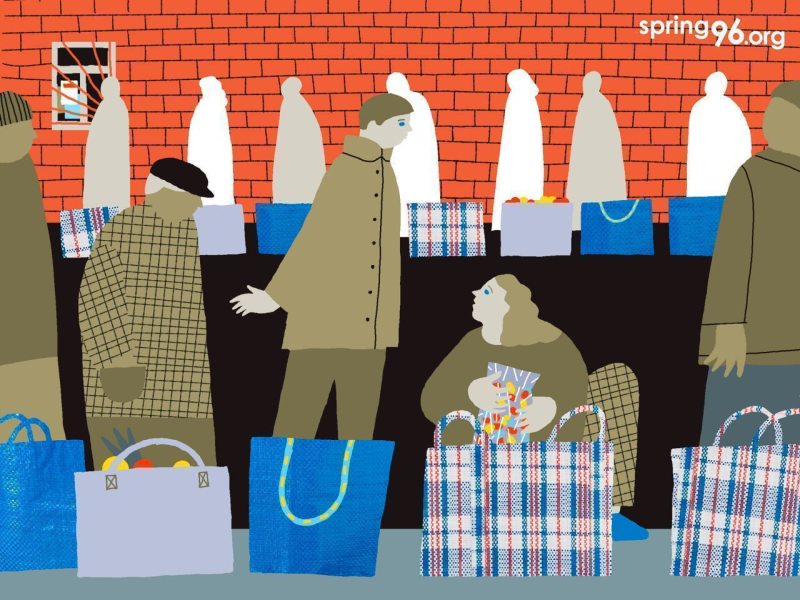
Solidarity without borders: a guide on supporting political prisoners from abroad



